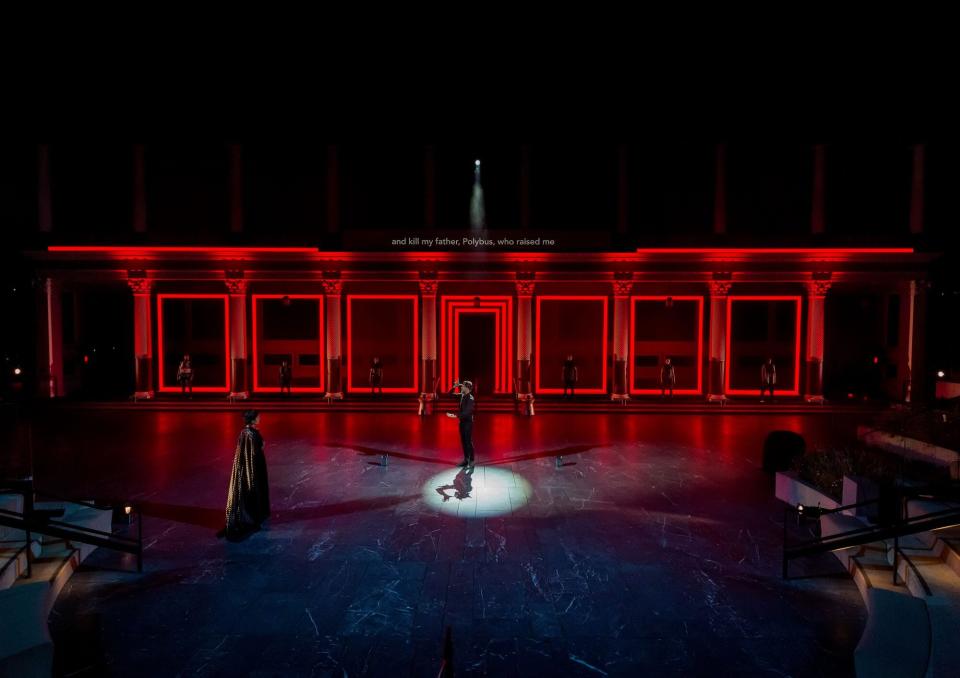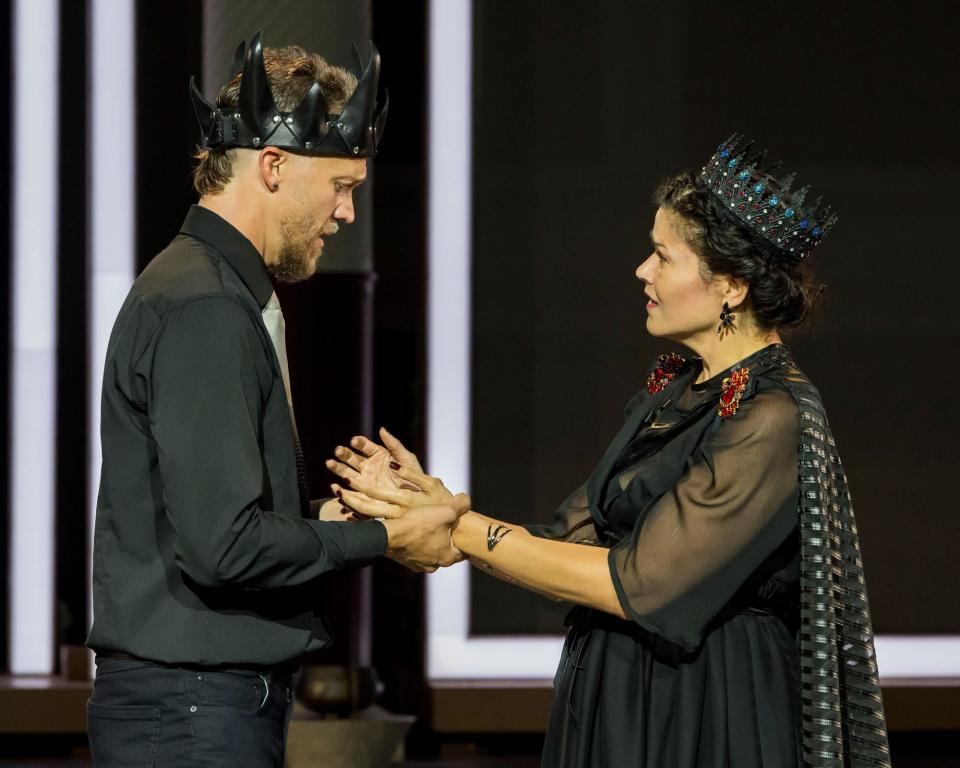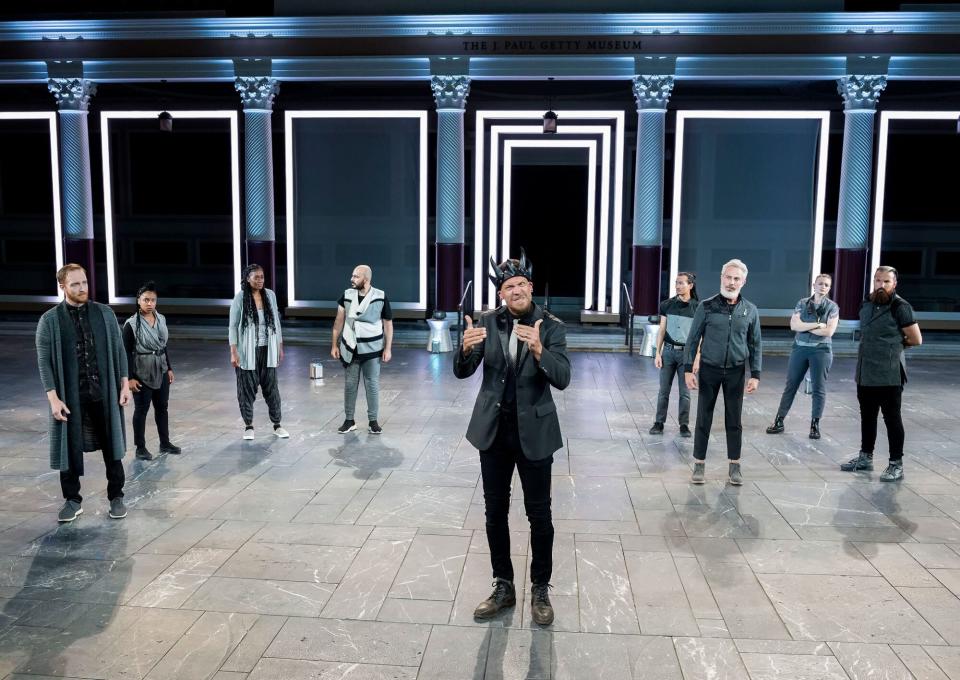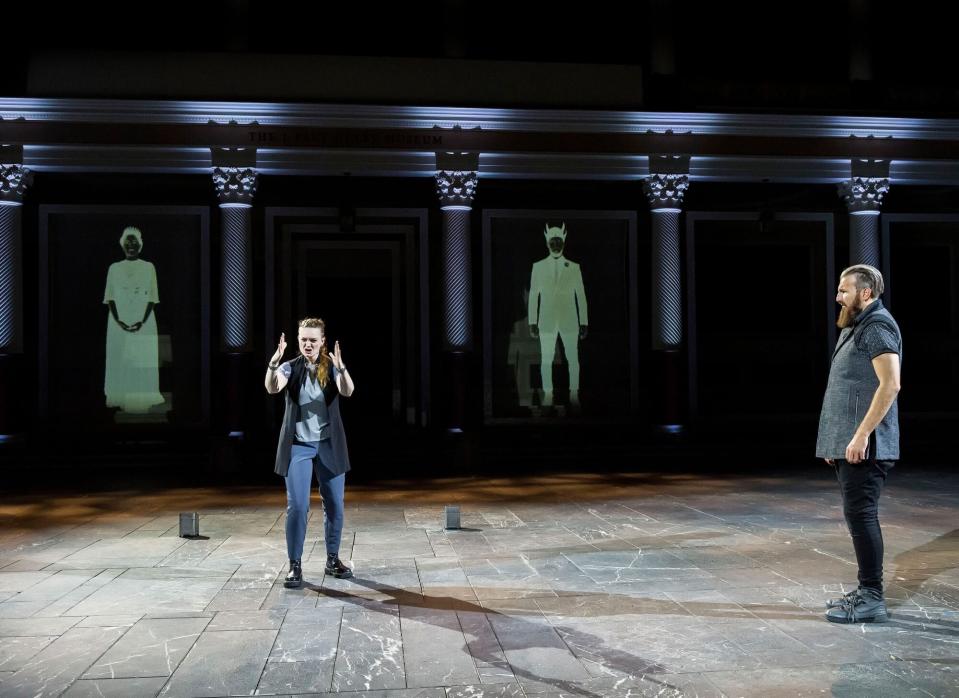Oedipus review: Deaf West returns the tragedy to its most physical form

- Oops!Something went wrong.Please try again later.
Each summer, the Getty Villa in Los Angeles reenacts an ancient tradition, gathering an audience under the stars, in an amphitheater hewn into the side of a hill, to watch a drama unfold.
This season, they're partnering with Deaf West Theatre, the groundbreaking company that mounts shows in both spoken English and American Sign Language, offering an unprecedented platform for deaf actors. Perhaps few pieces would be a better fit for their work than a Greek drama, the inherent physicality of their performance aligning the storytelling with its earliest form.

Craig Schwartz 'Oedipus' at the Getty Villa
Oedipus, now playing through Oct. 1, is an excellent rendering of this. Most audiences probably know the core story well: Oedipus (here played by a blustering, bruising Russell Harvard), king of Thebes, has spent his life trying to avoid fulfilling a prophecy that says he will murder his father and marry his mother. But when a plague comes to Thebes and he seeks answers from an oracle and a seer, he uncovers the terrible truth that destiny is inescapable.
In keeping with the simplicity of the approach, the production takes place on a bare stage lined by a series of lit panels that offer pops of color as the tragic events swirl to their inevitable conclusion. The lighting design by Jared A. Sayeg and the sound and score by Peter Bayne are powerfully resonant channels for the story's outsize themes and horrors. The low rumble of gongs, clash of musical cues, and flashes of purple and red underscore the drama with a gentle yet searing touch.

Craig Schwartz 'Oedipus' at the Getty Villa
Harvard presents a fascinating take on the doomed king, a man bristling with anger that he easily unleashes on everyone from his brother-in-law Creon (a steadying Jon Wolfe Nelson) to blind prophet Tiresias (a commanding Ashlea Hayes). Alexandria Wailes shines as his wife (and mother!), Jocasta, a soothing and maternal presence who comes undone as she realizes the truth before Oedipus does.
At times, the performances can veer toward overly presentational, which can blunt the emotional depth of it all, but it's hard to fault the production for the choice when it's done with such intention. The Greeks are credited as the inventors of the theatrical form (though storytelling itself is far more ancient), and they were working out just how to convey drama through actors assuming the guise of another. This more physical form, while perhaps jarring to a modern audience, is a more authentic realization of the text itself (though this new adaptation by director Jenny Koons can skew too contemporary in its dialogue and turns of phrase).

Craig Schwartz 'Oedipus' at the Getty Villa
Nowhere is this physicality better realized than in the Greek chorus and the revelatory work of Amelia Hensley as the palace servant. The chorus delivers its narration and thematic meditation purely through ASL, with no subtitles but with choreography, turning each of their sequences into something more reminiscent of an interpretative dance, poetry through movement rather than spoken word.
Hensley is the jewel of the production, arresting in her depiction of its most potent events. Like so many of these dramas, the climax of the action occurs offstage in the form of Jocasta's suicide and Oedipus' discovery of her body and subsequent self-inflicted blinding. As the palace servant, Hensley must deliver to both the audience and the chorus leader (Andrew Morrill) an account of these unspeakable horrors. She does so entirely in ASL, the intensity of her movement and the sorrow that subsumes her entire body relaying what she has witnessed with a grief that defies speech.

Craig Schwartz 'Oedipus' at the Getty Villa
We don't need the dialogue projected to understand. Every awful moment, from Jocasta's throwing open of the palace doors to her death to Oedipus' howling grief and blinding, is tragically clear in her signing and embodiment of the action. Hensley's job is to offer a satisfying climax entirely through description, and she not only rises to the challenge, but exceeds it. The entire audience hangs on her every move, an expectant, attentive silence sweeping the crowd.
In this moment, the purity of intent and execution is crystallized. Deaf West has always been a sterling example that drama in its most distilled and powerful form does not require speech. Here, their approach to their work finds its ideal vessel in the roots of dramatic tradition. Oedipus is a haunting tale of fate, but the real destiny here may just be this perfect marriage of story and teller. A-
Oedipus runs at the Getty Villa in Los Angeles through Oct. 1.
Related content:

